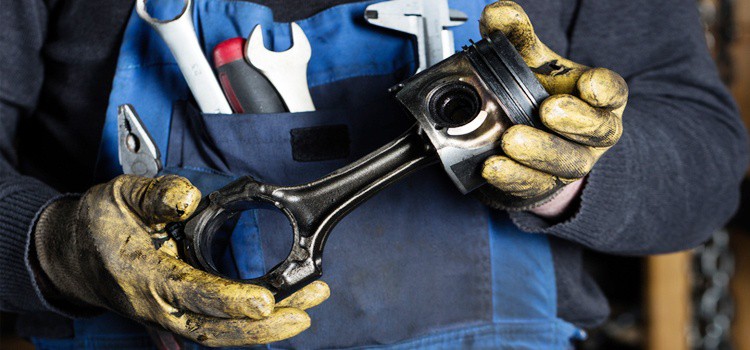Piston slap is an unwelcome sound of your engine that no driver wants to hear. When the piston is not fitted properly in the cylinder, it is excessively loose and begins to rock back and forth, resulting in a slapping noise. This annoying, distracting, and often embarrassing noise can leave many wondering how they can fix a piston slap. In this comprehensive guide, we will explain why this knocking would occur, and take a deep dive into the various methods to rectify this issue so that your engine can run smoothly and quietly once again.

Image: eaglesgarage.com
Understanding Piston Slap: The Root Cause of the Rattling
The main cause of piston slap is excessive clearance between the piston and the cylinder bore. This is usually caused by wear and tear over time, but can also be caused by improper installation or a manufacturing defect. The clearance allows the piston to move excessively within the cylinder, causing it to slap against the cylinder walls as the engine runs.
Diagnosing Piston Slap: Pinpointing the Source of the Noise
Identifying piston slap with certainty requires a trained ear and some detective work. If you suspect that your engine is experiencing this issue, listen carefully to the noise when the engine is running. Piston slap is characterized by a distinctive slapping or rattling sound that is most noticeable during idle or low-speed driving. The noise may also increase in intensity when the engine is under load.
Fixing Piston Slap: Exploring Different Approaches
Unfortunately, there is no definitive answer to whether piston slap can be fixed permanently. If the issue arises from a worn engine with large clearances between the piston and the cylinder, trying to repair the noise can be a costly and risky endeavor. For those with more minor cases where the piston is only slightly loose or has improper ring seal, there are several options to consider:
-

Image: carcarelab.comThicker Oil: A Temporary Solution for Milder Cases
Replacing your engine oil with a thicker, higher-viscosity oil can help reduce piston slap by increasing the oil film between the piston and the cylinder walls. While this is a relatively inexpensive and simple solution, it is only a temporary fix. The use of thicker oil may not completely eliminate the noise and can affect engine performance.
-
Engine Decarbonization: Cleaning Up the Cylinder
Carbon buildup in the combustion chamber can increase the clearance between the piston and the cylinder, leading to piston slap. Engine decarbonization by a professional mechanic involves removing the cylinder head and manually cleaning the carbon deposits using chemical cleaners or walnut blasting. While decarbonization may help reduce piston slap, it is important to address the underlying cause to prevent the issue from recurring.
-
Replacing Worn Parts: A Comprehensive Repair
In some cases, the issue lies beyond a simple piston-wall clearance. Inspecting the engine block and replacing damaged components, such as worn or broken piston rings, can help mitigate noises caused by excessive clearance and restore proper engine operation. However, this is a complex operation that requires extensive mechanical experience.
-
Installing Noise Suppressors: Dampening the Slapping Sounds
Engine noise suppressors are aftermarket devices designed to absorb or dampen the noise produced by piston slap and other engine vibrations. These devices are typically made of sound-absorbing materials and installed in the engine’s timing chain cover or oil pan. While they do not fix the underlying issue, noise suppressors can provide a noticeable reduction in audible noise.
-
Using Piston Expanders: An Emergency Solution with Uncertain Outcomes
Piston expanders can be used in an attempt to physically reduce the clearance between the piston and cylinder wall. The effectiveness and longevity of such expanders vary greatly, and they should only be considered as a possible solution after consulting with a qualified mechanic. Keep in mind that piston expanders can potentially damage the engine and should be used with caution.
How To Fix A Piston Slap
Conclusion: Making an Informed Decision
Fixing a piston slap can be complex task with varying degrees of success. While quick fixes like thicker oil or noise suppressors may temporarily mask the slapping sound, a thorough diagnosis and professional repair are crucial to address the root cause and restore engine longevity. In extreme cases where excessive mechanical wear is present, a more drastic engine overhaul or replacement may be necessary. Consulting a reputable mechanic for a proper diagnosis and tailored solution is highly recommended and can save you from further engine damage and costly repairs.